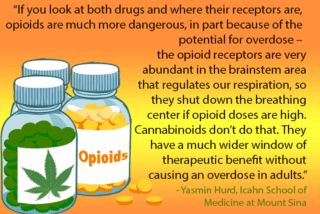
Dr. Hurd, the Ward-Coleman Chair of Translational Neuroscience and the Director of the Center for Addictive Disorders at Mount Sinai, speaks here to cannabis’ medicinal properties. She has extensively studied whether marijuana can help ease withdrawal symptoms in heroin users, and her work was published in the journal Trends in Neurosciences this past Thursday. Dr. Hurd’s work was inspired by the ever-increasing issue of opioid addiction, which has become a huge epidemic in the United Sates–an epidemic estimated to have economic costs of at least $78 billion in the US alone. The overprescribing of opioids leaves many addicted to legal drugs such as hydrocodone and oxycodone, but it also is a gateway to heroin addiction for far too many.
Dr. Hurd’s findings show that opioids are far more neurologically dangerous than cannabis. Further, she asserts that not only does cannabis have therapeutic properties, it can reduce heroin cravings and restore some of the neurobiological damage caused by opioid use as well.
The DEA decided against rescheduling cannabis last year on the grounds that marijuana is not a commonly accepted “safe and effective” medicine. The DEA has us in a catch-22, since a large part of the reason cannabis is not commonly accepted as medicine by the scientific community is because there is a dearth of high-level cannabis research because of cannabis’ federally illegal status. One can only hope that with new research such as Dr. Hurd’s, the DEA (and the federal government in general) can begin to accept that marijuana is shockingly safe and does have medicinal qualities, and then move forward accordingly. If truly accomplished scientists are declaring cannabis to be a non-addictive and effective medicine, as based on their own rigorous scientific research, it is high time (pun intended) the DEA catches on.























